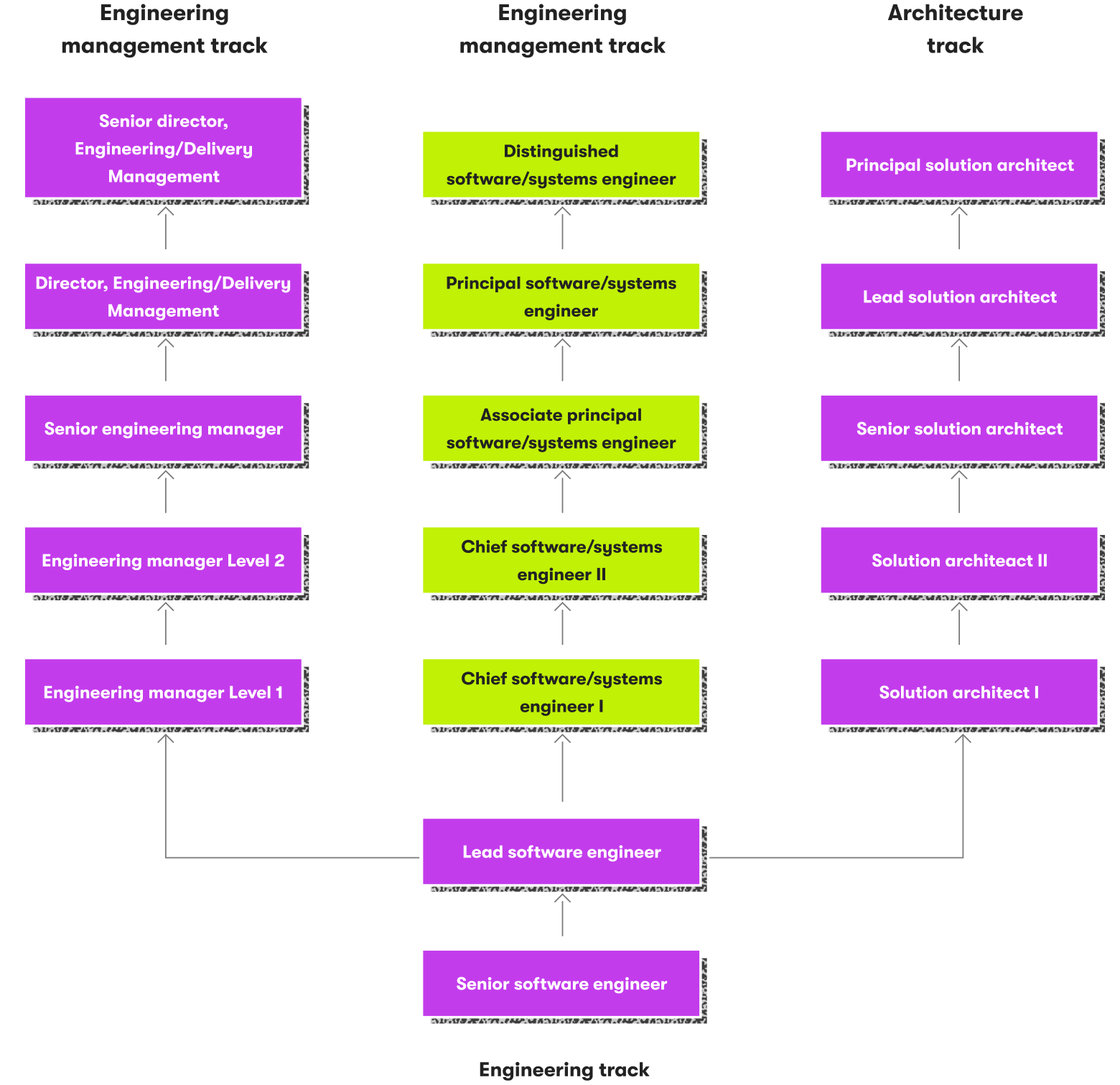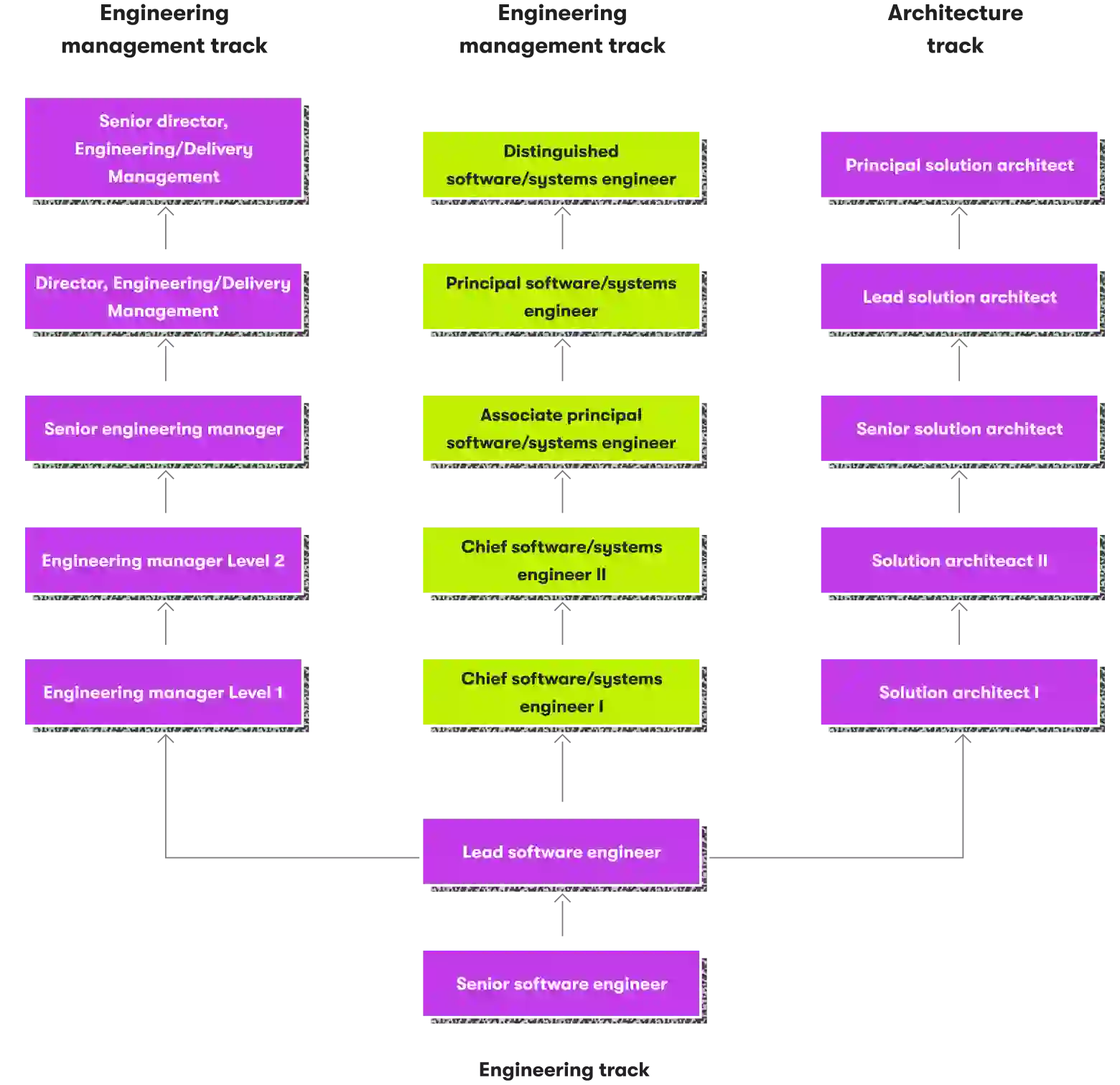At some point, every software engineer faces a crucial question regarding a career path to take. Should you stick with the technical track as an individual contributor, or take on a leadership role within management?
The manager vs engineer crossroads has a direct impact on your career trajectory, which means your final choice can have a significant effect on your potential career growth. Plus, both jobs have distinct requirements, qualifications, and expected outcomes — different people will thrive in each job description.
There is a lot to consider when choosing between these options. So, how do you make the right decision?
Let's examine each career track and explore some self-assessments that can help you decide between the management and engineering paths.
Common misconceptions about Manager vs Engineer roles
First, it is important to address some of the common misconceptions about technical engineers and managers. The more accurate and realistic information you have about each job, the easier it will be to select the path that best reflects your goals.
Myth #1: Managers have no technical skills
It is no surprise that you need specific abilities to run an executive team. But that doesn’t mean the management track involves no technical skills. Often, it is the best programmers who move into management. Tech competency and problem-solving are needed for both career paths.
Myth #2: Engineers have no leadership skills
Taking the principal software engineer track does not mean you miss out on leadership opportunities. Senior engineers use a robust set of soft skills to train, educate, and control projects, even as they remain on the more technical side.
Myth #3: Technical tracks require no people skills
The common belief is that coding is a solo task completed outside of a team. In reality, high-level software engineers need excellent people skills, personal management, and the ability to collaborate. Yes, technical engineers lean more towards independent work in nuanced technologies, but their work still involves the people skills that managers focus on.
Myth #4: Management expends no direct efforts on projects
The management track does involve more time on internal operations and customer engagement. But that doesn't mean you skip project builds with your team. Rather, it means spending more time with a particular project, as success outcomes are now your responsibility.
Engineering vs management career paths
In reality, many of the skills required by both career tracks are interchangeable. What does change is the extent of the specialization and the emphasis on particular activities that you will engage in. Your choice is about selecting what excites and energizes you, so you can grow in an environment best suited to your abilities and interests.
So, what do those individual tracks look like?
The engineering manager career path
The management side involves job requirements that focus on negotiation, strategy, and team oversight. Success is based on team accomplishments, customer satisfaction, and overall business efficiency gains.
At the very least, a manager will have a post-secondary degree and 5+ years of direct experience.
According to Zippia, the engineering manager career path has an expected growth rate of 3% during 2018–2028. You can expect job stability and plenty of professional development opportunities if you pursue this path.
The technical career path
Pursuing a career path on the technical side involves mastery of engineering fundamentals, direct action, and skill, often in multiple languages such as Python, Java, C, and SQL. Lead engineers fix problems, upgrade systems, train new engineers, and create the technical solutions required for success.
According to Zippia, the job growth rate for these positions is expected to increase by 21% between 2018 and 2028, offering many career opportunities.
An advanced degree is expected, in addition to about five years of direct experience to reach a tech lead role.
The middle ground: EPAM Anywhere Advanced Software Engineer
At EPAM Anywhere, we understand that technology continually changes. In recognition of the impact of this acceleration and adjustment in the job market, we created the Advanced Software Engineer track. It is a remote career path for the technologists at heart who also relish the thought of increased problem-solving and managerial duties.
In other words, you engineer the systems, but also recompose those systems according to your high-level strategy. It's the ideal mix of both lead engineer and manager tracks.
This third option that we offer to resolve the software engineer career dilemma is all about focus: do the activities you want to do each day. Specialize and grow your career on your terms.
Best of all, demand for these types of software engineers continues to grow, as many complex technical roles now also require technology leadership.

Engineer or manager? Assess yourself
While all of these career tracks offer many opportunities for career growth, how you fit within the different aspects of each role is the critical element for success. For example, a skilled yet unhappy manager might be better suited to the technical tracks, even if they could do well as a senior director.
To help you determine where your preferences lie, and whether you want to take on software engineering manager responsibilities, answer the following self-assessment questions:
1. Do you want to take on more responsibilities in your current position?
The direction of your personal aspirations contains clues identifying your ideal career track.
2. Do you prefer one-to-one training or building a team strategy?
Both career tracks involve management skills, but management involves more big-picture thinking, while engineering involves in-depth teaching.
3. Which do you prefer: meetings and presentations or troubleshooting?
The career track you choose will significantly impact your day-to-day activities.
4. Do you enjoy learning new programming tools and want advanced mastery in specific engineering skills?
Senior engineers spend far more time on specific technical tasks that lead to high-level skill.
5. Do you need to remain hands-on for all projects, or do you prefer to delegate responsibilities?
Management and senior engineers both share technical and interpersonal skills, but management spends less time focused on the development itself.
6. Are you interested in connecting business outcomes to customer expectations?
Those who select the management track are expected to have a deep understanding of market conditions and to translate that data into good business operations.
Next steps
Self-assessment can help point you in the right direction. But the choice between technical vs management career paths should not be taken lightly, so additional due diligence is beneficial. The following steps can help further confirm the best path for you.
- Find a mentor: Meet with senior colleagues from both engineering and management tracks — they have high-level knowledge and experience that could help you make your choice.
- Talk with co-workers: Gain insight from friends and teammates who have gone, or are going, through the same career dilemma as you.
- Give one option a trial run: In many cases, you’ll have opportunities to test either career path. See which best fits your skills and preferences through trial and error.

As Chief Editor, Darya works with our top technical and career experts at EPAM Anywhere to share their insights with our global audience. With 12+ years in digital communications, she’s happy to help job seekers make the best of remote work opportunities and build a fulfilling career in tech.
As Chief Editor, Darya works with our top technical and career experts at EPAM Anywhere to share their insights with our global audience. With 12+ years in digital communications, she’s happy to help job seekers make the best of remote work opportunities and build a fulfilling career in tech.
Explore our Editorial Policy to learn more about our standards for content creation.
read more





















